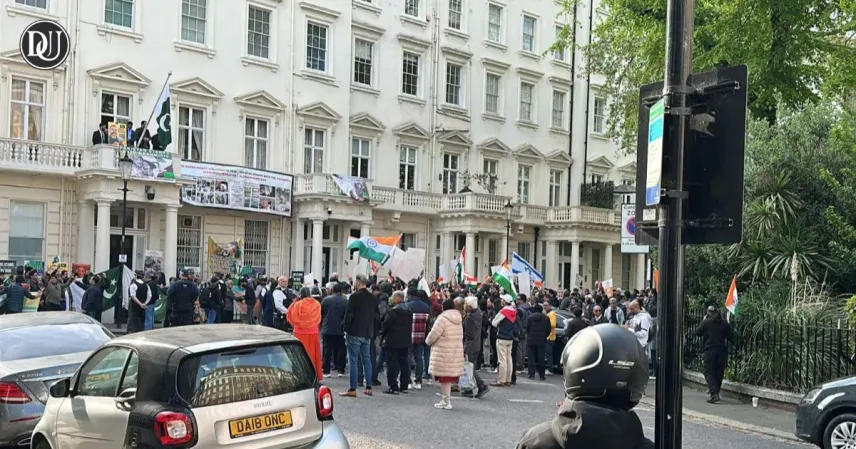A recent incident in London has left many people stunned and angry, shining a light on the volatile relations between India and Pakistan. During a protest outside the Pakistan High Commission, a senior Pakistani diplomat made a throat-slit gesture towards the demonstrators. The protestors were there to speak out against the devastating Pahalgam terror attack in Jammu and Kashmir, which took the lives of 26 innocent people.
The video, which has quickly gone viral, shows Colonel Taimur Rahat, a high-ranking officer at the Pakistani High Commission, standing on a balcony, looking down at the crowd and making the chilling gesture. The throat-slit motion is commonly seen as a violent threat and one that has no place in diplomatic conduct.
A Gesture That Speaks Volumes
The throat-slit gesture has a universal meaning—it’s a symbol of death, a clear signal of harm. That it was made by a diplomat, someone representing his country abroad, raises serious questions about the level of professionalism expected from those in positions of power. For many, this gesture goes far beyond a mistake; it’s a dangerous provocation that could escalate already tense relations.
The Pakistani High Commission has yet to offer an explanation, but the incident has already sparked outrage on social media and beyond, leaving many to wonder what message is being sent by such behavior.
Growing Tensions Amid the Pahalgam Attack Fallout
The throat-slit gesture came on the heels of the Pahalgam terror attack, which has already caused a massive diplomatic rift. The attack, which occurred on April 22, 2025, led to accusations from India that Pakistan is not doing enough to curb cross-border terrorism. This tragic event had already led to several diplomatic actions, including the expulsion of Pakistani diplomats and serious talk about revisiting longstanding agreements between the two countries.
Now, this new gesture from a Pakistani official only adds fuel to the fire, intensifying protests and calls for accountability. It has further divided opinions, with some questioning the conduct of Pakistani officials and the broader implications for peace and diplomacy.
The Path Forward: Accountability and Diplomacy
As the video continues to circulate and the controversy deepens, it’s clear that this incident will not be easily forgotten. The diplomatic community, both in London and elsewhere, is watching closely to see how both governments will respond. While tensions remain high, this may be an opportunity to reaffirm the importance of diplomacy, respect, and peaceful communication.
For the people directly affected by the Pahalgam attack, the video only adds to their pain. What was meant to be a peaceful protest seeking justice has now become a symbol of the challenges that continue to plague India-Pakistan relations. The hope is that this unsettling moment will serve as a reminder of the need for healing, dialogue, and a commitment to ending cycles of hostility.










